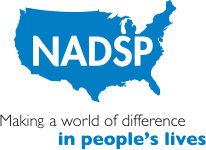
Joint Position Statement on the DSP Workforce
Individuals with intellectual and developmental disabilities (IDD) have long sought lives where they can be fully contributing and valued members of their communities. Federal regulations including the Americans with Disabilities Act (ADA), and more recently the Centers for Medicare and Medicaid Services (CMS) Home and Community Based Services (HCBS) Settings Rule and the US Department of Labor Workforce Innovation and Opportunity Act (WIOA) have set forth standards aimed at making inclusion and employment a reality. The availability of a qualified, competent and stable Direct Support Workforce plays an important role in supporting people to accomplish these goals. To be successful, it is critical that Direct Support Professionals (DSPs) have the competence, confidence, ethical decision-making skills and guidance necessary to provide quality support, receive compensation that is commensurate with job responsibilities and have access to a career path aligned with ongoing professional development.
Issues
The stability of the direct support workforce has been a long-standing issue across disability service systems. The field is plagued with high turnover at a time when demand for additional direct support professionals to support both disability and aging populations in the United States is peaking. It is estimated that nationally more than one million new direct support positions will need to filled by 2022. This growing demand combined with limited availability of training and education and increased expectations and requirements make it essential that there be increased investment in this vital workforce.
The United States is at a critical juncture where workforce development, education and disability service systems must implement strategies to increase the capacity and quality of the direct support workforce. Action is necessary if we are to provide the support people with IDD need to live and participate in their communities. Self-advocates and family-advocates have fought hard for decades to ensure that supports provided are person-centered, increase inclusion, and lead to valued lives for people with intellectual and developmental disabilities. Researchers, practitioners, providers and policy-makers have recommended recruitment, retention, and education strategies to address this critical workforce need, however, they have yet to be sufficiently funded or brought to scale. If the charge to address the workforce crisis is not acted upon, the entire disability service system is at risk of going back to days of institutionalization, segregation, and stigmatization, turning the clock back on decades of advocacy and disregarding the voice of people with developmental disabilities across the country.
Low Wages
Wages paid to direct support professionals are comparable to those paid for entry level low wage positions in nearly all service industries. Insufficient wages affect workforce retention and the quality of support provided. There is a significant discrepancy between the job responsibilities and skill expectations required of DSPs and their low wages. Nearly half of direct support workers in the U.S. rely on public benefits. Others often work two to three jobs to support themselves and their families. Wages need to be increased. This, combined with other work related stressors, lead to DSP turnover which results in ineffective and inconsistent support for people with IDD.
Limited Training, Career Path and Credentialing Opportunities
The DSP role is complex because it is about supporting each individual in a person centered way within their unique context. The workforce must have the knowledge, skills, and ethical compass to perform a wide array of tasks that support people with intellectual and developmental disabilities be healthy, safe, valued and participating members of their communities. To achieve this, it is important that DSPs receive sufficient, high-quality training and opportunities for paid professional development on an ongoing basis.
No federal minimum training requirements exist for DSPs. Career pathways that provide DSPs an opportunity to increase competency and professionalism are a recommended strategy to improve retention of the workforce and quality of support. The National Alliance for Direct Support Professionals (NADSP) and the Centers for Medicare and Medicaid Services (CMS) have identified nationally validated competencies for DSPs that recognize the knowledge, skills and abilities need by DSPs to effectively support individuals with disabilities in the community. Several national organizations offer credential programs for DSPs who support people with IDD in varied roles. Despite the identification of required competencies, related credentialing and guidance1 from Medicaid about how to build training into HCBS reimbursement rates2 , use of established competencies to set workforce development and training standards is not widespread.
Ineffective Supervision and Organizational Support
DSPs are faced with fulfilling an increasing number of responsibilities in more autonomous situations. This will require that they be provided the professional development opportunities and have the support they need to ensure they are competent to provide support and be successful in their work. The supervision they receive is frequently inconsistent and ineffective. This can result from frontline supervision being the default career ladder for DSPs, often achieved without the requisite preparation necessary to succeed. It is important that supervisors are competent in critical skills to being an effective supervisor in long term services and supports for people with disabilities.
DSPs must be supported to effectively understand and utilize person-centered approaches designed to increase community inclusion for people with intellectual and developmental disabilities. Often systems and organizations promote these concepts but do not shift their organizational culture and practices to align with them. These changes may include increased use of technologies, flexible staffing patterns, and providing DSPs with the education and resources they need to make connections and build capacity within the community.
Position
Evidence-based practice must be widely implemented to increase the ability of individuals, families and employers to recruit, retain, and ensure the competence of DSPs to improve the quality of life and outcomes of supports provided to people with IDD. A comprehensive approach to address the need to build capacity within the direct support workforce, which should include the following:
- Allocate federal and state funding at levels sufficient to provide living wages and the benefits necessary to attract and retain qualified DSPs in home and community based services.
- Provide credentialing opportunities, career pathways, and ongoing competency-based training and mentoring, embedded in public policy and sufficiently funded to create incentives for DSP participation.
- Ensure frontline supervisors are adequately trained and support to effectively recruit, retain and support DSPs.
- Implement and evaluate the use of technologies as a universally-designed option for support while simultaneously providing relief to the increased demand for support and support workers.
- Ensure DSPs have opportunities for needed training, mentoring and professional development to effectively assist people with IDD to be fully included, valued, and participating members of their communities.
Adopted:
Board of Directors, American Association on Intellectual and Developmental Disabilities
May 18, 2016
Board of Directors, The National Alliance for Direct Support Professionals
May 12, 2016
1 Robbins, E., Dilla, B., Sedlezky, L., Sirek, A.J. (2013). Coverage of Direct Service Workforce Continuing Education and Training within Medicaid Policy and Rate Setting: A Toolkit for State Medicaid Agencies. The Lewin Group. Retrieved from: https://www.medicaid.gov/medicaid-chip-program-information/by-topics/long-term-services-andsupports/workforce/downloads/dsw-training-rates-toolkit.pdf
2 Centers for Medicare and Medicaid Services (2015). Questions and Answers: Administrative Claiming Related to Training and Registry Costs. Retrieved from: https://www.medicaid.gov/medicaid-chip-program-information/bytopics/financing-and-reimbursement/downloads/qa-training-registry-costs-071015.pdf
You May Also Be Interested In …

Our Latest Explanation of the Reconciliation Bill Debate: It’s still a mess!

2025 NADSP Conference: Elevate

Let’s Talk: Embracing Diversity Equity and Inclusion: A Pathway to Professional Excellence for DSPs

